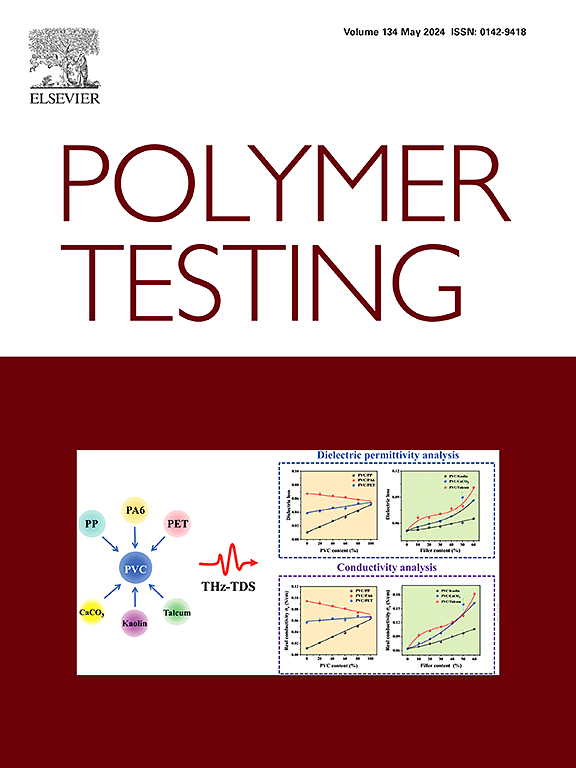Optimizing conductive properties of polymer carbon nanofiber composites: Insights from an extended Hui-Shia model
IF 5
2区 材料科学
Q1 MATERIALS SCIENCE, CHARACTERIZATION & TESTING
引用次数: 0
Abstract
The existing models for the electrical conductivity of polymer composites with carbon nanofiber (CNF) called as PCNFs are incomplete, thereby limiting their optimization. In this study, the Hui-Shia model is simplified and advanced to accurately foresee the PCNF conductivity by incorporating the main features of CNFs, interphase, and tunnels. The volume fraction of the CNF/interphase network is derived based on the onset of percolation and effective CNF content, while the total conductivity of CNF and tunnels is expressed through tunneling properties. The developed model is evaluated using experimental data from various PCNF systems and through parametric analyses. Theoretical and experimental results demonstrate good agreement, validating the developed model. An insulative PCNF is observed at a CNF radius (R) greater than 90 nm and an interphase depth (t) less than 11 nm. Conversely, the maximum conductivity of 1.5 S/m is achieved with the thinnest CNFs (R = 40 nm) and the thickest interphase (t = 40 nm). Furthermore, very small contact diameters (d less than 17 nm) do not result in significant conductivity; however, the maximum conductivity of 0.27 S/m is observed with the widest tunnels (d = 40 nm) and the highest CNF aspect ratio of 1000.
优化聚合物碳纳米纤维复合材料的导电性能:来自扩展的Hui-Shia模型的见解
现有的碳纳米纤维(CNF)聚合物复合材料(pcnf)的电导率模型是不完整的,从而限制了其优化。本研究对Hui-Shia模型进行了简化和改进,通过结合cnf、间相和隧道的主要特征来准确预测PCNF的电导率。CNF/间相网络的体积分数是根据渗透开始时间和有效CNF含量得出的,而CNF和隧道的总电导率是通过隧道性质来表示的。利用各种PCNF系统的实验数据和参数分析对所建立的模型进行了评估。理论与实验结果吻合良好,验证了模型的有效性。在CNF半径(R)大于90 nm,相间深度(t)小于11 nm时,观察到绝缘PCNF。相反,最薄的CNFs (R = 40 nm)和最厚的界面相(t = 40 nm)的最大电导率为1.5 S/m。此外,非常小的接触直径(d小于17纳米)不会导致显著的电导率;然而,在最宽的隧道(d = 40 nm)和最高的CNF长径比为1000时,观察到的最大电导率为0.27 S/m。
本文章由计算机程序翻译,如有差异,请以英文原文为准。
求助全文
约1分钟内获得全文
求助全文
来源期刊

Polymer Testing
工程技术-材料科学:表征与测试
CiteScore
10.70
自引率
5.90%
发文量
328
审稿时长
44 days
期刊介绍:
Polymer Testing focuses on the testing, analysis and characterization of polymer materials, including both synthetic and natural or biobased polymers. Novel testing methods and the testing of novel polymeric materials in bulk, solution and dispersion is covered. In addition, we welcome the submission of the testing of polymeric materials for a wide range of applications and industrial products as well as nanoscale characterization.
The scope includes but is not limited to the following main topics:
Novel testing methods and Chemical analysis
• mechanical, thermal, electrical, chemical, imaging, spectroscopy, scattering and rheology
Physical properties and behaviour of novel polymer systems
• nanoscale properties, morphology, transport properties
Degradation and recycling of polymeric materials when combined with novel testing or characterization methods
• degradation, biodegradation, ageing and fire retardancy
Modelling and Simulation work will be only considered when it is linked to new or previously published experimental results.
 求助内容:
求助内容: 应助结果提醒方式:
应助结果提醒方式:


